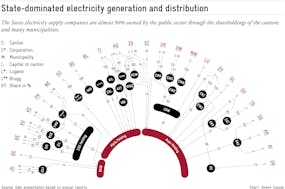What is the right path for a country like Switzerland? Does its future lie in jettisoning hallowed independence for the safety of numbers, throwing in its lot with a bigger, more powerful grouping like the European Union? Or is the best strategy for guaranteed prosperity to emulate Britain and go it alone to protect sovereignty and decide independently about crucial issues like immigration and trade?
Each approach has its merits. Donald Trump’s America has shown even close friends can turn quickly into antagonistic rivals. Giants like China and Russia become less predictable than ever. Such circumstances may favour cosying up ever closer to one’s neighbours. Others would argue, however, that precisely such conditions make self-reliance more vital than ever
As the UK has sadly shown, making well informed choices on such monumental, possibly existential, issues, is anything but easy. Sober debate can degenerate quickly into prejudice and bigotry, with emotion triumphing over reason.
Even in consensus minded Switzerland, passions are often enflamed when it comes to the big issues. Evangelists for closer links with the EU, or even outright membership, are derided regularly as “euro-turbos” intent on sacrificing centuries of hard won independence for subservience to “foreign judges” and the bureaucrats of Brussels.
Advocates of a strictly sovereign course, meanwhile, and greater economic autarchy, are dismissed as blinkered bigots living in a time warp, unwilling or unable to recognize the realities of a globalized world.
Time enough, surely, to bring sense into the debate. That’s best done by looking dispassionately at the costs and benefits of the different courses of action, whether one of the two extremes, or some point along the spectrum. Switzerland has tough choices to make about its future. Decisions reached today will reverberate for decades to come.
How timely, then, that Avenir Suisse should grasp the nettle and publish an authoritative White Paper on six scenarios for Switzerland’s future. In its pages, a group of experts from Switzerland’s leading think tank try to cast prejudice and party politics aside to address soberly the consequences of different courses of action for their country.
Not surprisingly given their liberal convictions and bias for business, the authors have opted broadly in favor of cautious rapprochement with Brussels and further integration into the globalized trading system. They even show some sympathy for what for most Swiss is the extreme option of eventual EU membership, arguing that, in extremis, should the EU turn into a trade hegemon, the marginal loss of sovereignty could be far outweighed by the economic benefits guaranteed.
Irrespective of one’s own position, the publication commands respect. The authors have been guided by pragmatism, not prejudice or personal politics. Their only central principle has been a determination to maintain Swiss prosperity, created over centuries, and based on maintaining competitiveness, even in often adverse circumstances.
Not everything is perfect, of course, as the authors themselves are first to recognise. Swiss prices remain astronomically high compared with most neighbours, not least because of a still protectionist agricultural system defended tooth and nail by a formidable farm lobby.
Action also needs to be taken to ensure a sustainable public pensions system, probably requiring some painful reforms. Healthcare, while generally excellent, is exceedingly expensive. Education, while deservedly well regarded, has not as yet responded adequately to the digital challenge. Even Swiss infrastructure, so prized abroad, is not always up to its international reputation.
The chaos in Britain over Brexit provides a sad lesson in how not to discuss, let alone implement, monumental decisions that will affect generations to come. Even if it stimulates discussion only among a small elite (the authors hope for much more) Avenir Suisse’s latest effort is to be warmly welcomed.





